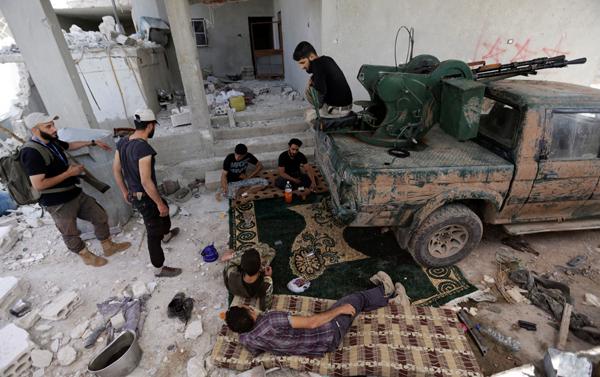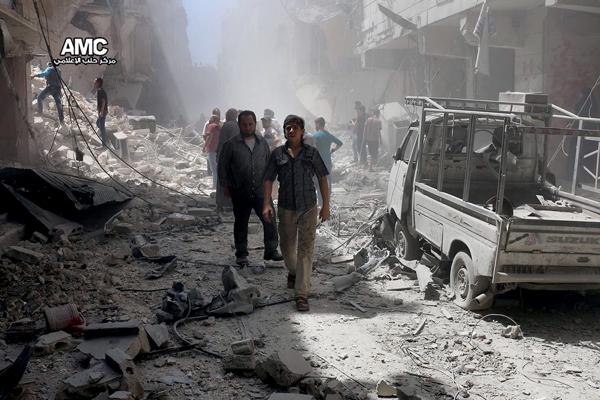You are here
Syrian rebels' Aleppo success complicates strategies of Assad, Russia
By Reuters - Aug 11,2016 - Last updated at Aug 11,2016
BEIRUT — In breaking a Syrian government siege on opposition-held areas of Aleppo, insurgents have set back President Bashar Assad's hopes of using Russian air power to reclaim a vital city and speed the end of the five-year conflict.
The sudden advance by fighters from western Syria into a military complex in southwest Aleppo on Saturday opened a corridor into the city, breaking the weeks-long siege and providing a launch pad for fresh attacks into government-held territory.
Whether they can hold, or even consolidate, their gains in a war marked by fluctuating fortunes is unclear, but the insurgents' success showed they are capable of checking the momentum that Russia's air campaign has given Assad in recent months.
In Aleppo the disparate groups fighting the Syrian government army demonstrated a rare unity, while also dealing a blow to Assad, Moscow and their Iran-backed allies who have invested heavily in a victory in what was the country's most populous city before the war.
"It's clear that Aleppo will be the toughest and most important battle and most dangerous battle and the longest of all the battles that have erupted," said former Lebanese general Amine Hotait, a supporter of Assad, in an article in the Syrian daily Al Thawra.
Aleppo is important not only because of its size but also for its location near Turkey, a powerful supporter of anti-Assad groups operating it the city. In addition, its rebel-held areas are the main stronghold of most opposition groups apart from the extremists of the Daesh terror group.
The defeat of the Aleppo insurgents could have been seen in Damascus and Moscow as a precursor to the collapse of the armed rebellion against Assad's rule.
Government media have declared the fighting as "the mother of all battles", while Assad's ally in the war, the Lebanese Hizbollah movement, has called it "an existential struggle".
For their part, the rebels speak of an "epic battle to liberate Aleppo", rallying support by citing the plight of trapped civilians in the city being pummelled by air strikes which have regularly hit hospitals and market places.
Rare opposition unity
By far the rebels' biggest coordinated assault since the conflict began in 2011, the Aleppo campaign suggests they have strengthened their capabilities despite suffering heavy losses since Russia began striking against them almost a year ago.
An estimated 6,000-8,000 rebel fighters from different groups, using dozens of tanks, broke the Syrian army's fortress-like defences at Ramousah in southwest Aleppo in only a few days. Suicide bombers led the advance.
The groups ranged from the Islamist alliance Jaish Al Fateh, which includes Jabhat Fateh Al Sham, known as Al Nusra Front until it cut ties with Al Qaeda two weeks ago, to the Free Syrian Army (FSA), vetted and backed by the West.
Jaish Al Fateh drove the army and its allies last year from Idlib province, southwest of Aleppo, before the Russian intervention in Syria turned the tide in Assad's favour.
Last week's success will raise the standing of the rebranded Al Nusra Front, whose change of name was made partly to narrow differences with mainstream rebels.
The rebel groups' unity this time, however, seemed mostly to be born of unease at the gradual advances made by government forces since Russia's entry into the war.
"We were divided and distanced. Today we are one and the goal is the regime. There are no longer problems between us and we have one enemy who can destroy us, so we became one hand against it," said Alaa Al Saqar, a senior military commander in Fatah Halab, the main umbrella group for FSA groups that are present in Aleppo.
Bombing campaign
After years of near deadlock in Aleppo, it was the air campaign that began with Russia's intervention last September that finally brought Assad within sight of a major victory.
Last month the Syrian army took control of the Castello Road in northern Aleppo, the insurgents' last route into the city, laying siege to the 250,000 people who live in their sector.
Rebels and civilians in opposition-held areas, already facing the bombardment, now contended with a shortage of food, medicine and fuel as the world looked on.
But Friday's seizure of the Ramousah Base cut the government's own main route into the city and meant the army was instead scrambling to bring supplies to the two million people in its own areas.
Residents in government-held districts say oil and food are now being brought in under cover of night via the same hazardous route near the front line that was previously used by rebels.
The rebels now want to advance further into government-held areas, mobilising thousands of fighters from Syria's northwestern countryside.
"It's the rebels who turned the tables on the strategy of the siege," said a senior Western diplomat based in the region.
This also represents a setback for Moscow, the diplomat said, which saw victory in the city as vindicating its intervention.
So single-minded was Moscow in the pursuit of the Aleppo campaign that it defied US calls for an easing of the stranglehold on the city, despite the risk of jeopardising a deal with Washington to cooperate in strikes against militants.
Protracted battle
With the insurgents now saying they are preparing to assault western Aleppo, so far spared the devastating aerial bombardment of rebel-held districts, a yet more protracted and bloody battle is in prospect, rebels, government sources and diplomats say.
In eastern Aleppo, communities moved en masse from front-line zones to other parts of the city, a pattern that might now be repeated in the government-held west, residents say.
The rebels regard their success as evidence they can turn the tables even in the face of Russian might, and that their goal of toppling Assad is no longer far-fetched.
"After these battle gains, we defeated the military option the Russian invaders and their Iranian allies and Hizbollah wanted to impose," said Mohammad Al Shami, a commander from the powerful Ahrar Al Sham group, a member of the Jaish Al Fateh Islamist alliance.
"Today those planning for the regime are Russian officers, the Iranians and Hizbollah, and they have all fought battles but we have beaten them," the bearded fighter added.
Related Articles
BEIRUT/AMMAN – Militants in Syria including Al Qaeda are mobilising again for all-out war against President Bashar Assad, taking advan
BEIRUT — Syrian government forces delivered food and fuel to neighbourhoods they control in the divided city of Aleppo on Monday, using an a
AMMAN — Syrian warplanes attacked militants near the northern city of Aleppo on Sunday, both sides said, as the government tried to push bac
















